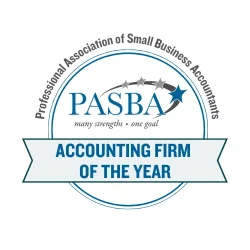Every business owner has to pay taxes, but the tax rates vary depending on different factors, such as the type of business, amount of income, and where the organization is located. Small businesses are no exception to this rule. As a small business owner, understanding your tax obligations is crucial for financial planning and compliance with government regulations.
Taxes are a necessary and inevitable part of doing business, but with proper planning and knowledge, small business owners can optimize their tax strategy for efficiency and compliance. The following guide explores the different types of taxes that small businesses may be subject to and provides tips for managing them effectively.
Factors Influencing Business Tax Rates
The amount of taxes your business pays can depend on several different factors. Understanding these factors can help you plan and manage your tax strategy effectively. Some of the key factors that influence the amount of business taxes you’ll end up being responsible for include:
State Tax Rates
State tax rates vary from one state to another and can significantly impact the total tax burden for your small business. Some states have higher corporate income taxes, while others may have lower sales or property taxes. For example, the corporate income tax rate in California is 8.84%, while in Nevada, it’s 0%. It’s essential to research and understand the state tax rates in your area to determine their impact on your business taxes.
Business Structure
The structure of your business can also affect your tax rate. For instance, a sole proprietor may be subject to self-employment taxes and income tax on all their business income. On the other hand, corporations are taxed separately from their owners and may have different rates for federal income tax. The following outlines the different business structures and their corresponding tax rates:
Sole Proprietorships
A sole proprietorship is a business structure where an individual owns and operates the business, and there is no legal separation between the owner and the business. A sole proprietorship is arguably the simplest type of business entity and is not subject to separate income tax. Instead, sole proprietors report their business income on their personal tax returns and pay taxes at the individual tax rate.
Partnerships
A partnership is a type of business structure in which the ownership and responsibility of a company are shared by two or more people. Like sole proprietorships, partnerships are not taxed separately from their owners. Instead, each partner reports their share of the business income on their personal tax return and pays taxes at their individual rate.
Limited Liability Corporations
A limited liability corporation (LLC) is a hybrid structure. An LLC not only has the limited liability protection of a corporation, but also the flexibility of a partnership. Unlike sole proprietorships and partnerships, if you have an LLC, you can decide how you want your company to be taxed by the IRS. For example, you can be taxed as an S-corporation, a C-Corporation, a partnership, or a sole proprietorship.
Corporations
A corporation is a separate legal entity from its owners, and it pays taxes on its income. Corporations must pay the corporate income tax rate, which is 21% of the company’s profits at the federal level. Additionally, shareholders of corporations may also be subject to personal income tax on dividends or distributions they receive from the corporation.
Income, Payroll, And Other Taxes
Your business may also be subject to other taxes, such as payroll, sales, and property taxes. These types of taxes can vary depending on the size and type of business. For instance, a company with employees will be responsible for payroll taxes, while a business that sells goods or services may have to collect and remit sales tax.
Small Business Tax Rates
Small businesses are subject to various taxes, and it’s essential to understand each one to plan and manage your finances effectively. The following are the different types of taxes that small businesses may have to pay:
Federal Income Tax
As mentioned earlier, federal income tax rates for small businesses vary depending on the business structure. Sole proprietors and partnerships report their business income on personal tax returns and pay taxes at the individual rate. LLCs get to choose how they want to be taxed by the IRS, while corporations are required to pay corporate income tax rates. According to the U.S. Small Business Administration (SBA), the average federal income tax rate for small businesses is 19.8%.
State Income Tax
Like federal income tax, state income tax rates for small businesses vary by location and business structure. Some states may not have a separate state income tax, while others may have lower or higher rates than the federal level. In California, for instance, the state income tax rate is 1% to 13.3%, depending on income.
Self-Employment Tax
Self-employment tax combines the Social Security and Medicare taxes that self-employed individuals pay. This tax is typically 15.3% of net earnings (12.4% Social Security tax plus a 2.9% Medicare tax). Only the first $160,200 of your self-employment income is subject to Social Security tax, although this changes year by year.
Payroll Tax
Small businesses with employees are responsible for collecting and remitting payroll taxes, which include unemployment insurance (UI) and employment training tax (ETT). Employers are responsible for paying 6.2% on the first $7,000 in wages of each employee in UI tax (new employers are only responsible for paying 3.4% for the first two to three years), and 0.1% of the first $7,000 of wages of each employee in ETT. These rates do change over the years.
Sales Tax
Small businesses that sell goods or services must also collect and remit sales tax to the state. Remitting sales tax means sending the collected sales tax to the state government. Sales tax rates can vary by location and are usually calculated as a percentage of the sale price of goods or services. In California, the average sales tax rate is 7.25%, but it can be higher or lower depending on the city or county.
Capital Gains Tax
If your business sells an asset for more than its original purchase price, you may have to pay a capital gains tax on the profit. Examples of assets subject to capital gains tax include stocks, real estate, and equipment. The capital gains tax rate varies based on the holding period of the asset and the owner’s income. The tax rate is higher if the asset was held for less than a year and lower if held for more than a year.
Property Tax
Small businesses that own property will also be responsible for paying property taxes. This tax is based on the property’s value and can vary significantly depending on location and type of property. For example, the property tax rate for commercial properties can range from 0.2% to 4%, depending on the state. In California, the average property tax rate is capped at 1%.
Dividend Tax
If your business is structured as a corporation, you may also be subject to dividend tax if the company distributes profits to its shareholders. Dividend tax rates vary based on the shareholder’s income and holding period of the stock. In the United States, qualified dividend tax rates range from 0% to 20%, based on the shareholder’s income. Ordinary dividends are taxed at the shareholder’s individual tax rate.
Excise Tax
Some businesses may also have to pay excise tax if they produce or sell certain goods or services. Excise taxes are usually imposed on items such as fuel, alcohol, and tobacco. The rates for excise taxes can vary depending on the type of product and location.
How To Calculate Taxes For Small Businesses
Calculating taxes for small businesses can be complex and time-consuming. However, it’s crucial to do so accurately to avoid potential penalties and fines. The first step in calculating business taxes is determining the taxable income, which is the revenue earned minus any deductible expenses.
Next, depending on the business structure, the applicable tax rate must be applied to the taxable income. This includes federal and state income taxes, self-employment tax, payroll tax, sales tax, capital gains tax, property tax, dividend tax, and excise tax.
It’s essential to keep detailed and accurate records of all business transactions throughout the year to ensure an accurate calculation of taxes. Proper record keeping allows small business owners to track deductible expenses, such as business mileage, office supplies, and utilities. It also helps to avoid any discrepancies or errors when filing taxes.
Additionally, keeping proper records can also help in the event of an audit by providing evidence of income and expenses reported on tax returns. This documentation can aid in avoiding penalties and justifying deductions claimed on tax returns.

Tax Filing For Small Businesses
Small businesses are typically defined as independently owned and operated companies with a limited number of employees and lower revenue compared to larger corporations. The size of a business can play a significant role in taxation, as smaller companies may qualify for certain deductions or credits not available to larger corporations. Additionally, the size of a business can determine the type of tax forms that need to be filed and the deadlines for filing.
How Do Small Businesses Pay Taxes?
Small businesses can pay taxes in various ways, depending on their business structure. Sole proprietors and single-member LLCs must report business income and expenses on their personal tax returns using Schedule C. Partnerships and multi-member LLCs must file a partnership tax return (Form 1065), which reports the company’s income and deductions. S corporations must file an informational tax return (Form 1120-S), but the company’s income and deductions are reported on the shareholders’ personal tax returns.
C corporations, on the other hand, must pay taxes at the corporate level. This means that they must file a corporate tax return (Form 1120). If any profits are distributed to shareholders in the form of dividends, those profits may also be subject to dividend tax.
When Do Small Businesses File Taxes?
The deadline for filing taxes varies depending on the business structure. Sole proprietors and single-member LLCs must file their personal tax returns by April 15th of each year. Partnerships, multi-member LLCs, and S corporations have a deadline of March 15th to file their informational tax returns.
C corporations have a different tax year and must file their corporate tax returns by the 15th day of the fourth month after their fiscal year ends. For example, if a corporation’s fiscal year ends on December 31st, its tax return would be due by April 15th.
Tips For Managing Your Business Taxes Effectively
In addition to avoiding potential tax penalties, properly managing and paying taxes is crucial for the financial health of a small business. Accurately calculating and paying taxes ensures the business has enough funds to cover its tax obligations without negatively impacting cash flow. The following are a few tips on how to manage business taxes effectively:
- Monitor expenses: Keeping track of business expenses throughout the year can help in claiming deductions and reducing taxable income. There are 2 main types of deductible expenses for small businesses:
- Fixed expenses: These are expenses that don’t change like rent, insurance, and software subscriptions.
- Variable expenses: These expenses are expected but can change like utilities, wagers, and cost of goods.
- Dedicate some assets to charitable contributions: A small business can deduct any charitable contributions they have made to qualified organizations, such as non-profits. Companies can dedicate a portion of their assets, such as products or services, to charitable donations while also reducing taxable income.
- Deduct business losses: Small businesses may be able to deduct business losses from previous years, known as net operating losses (NOL). This can help offset taxable income and reduce the taxes owed in the current year.
- Take advantage of startup deductions: Newly formed businesses can deduct upwards of $5,000 in startup costs. They can also deduct an additional $5,000 in organizational expenses. These deductions can help reduce the tax burden for small businesses in their first year of operation.
- Maximize contributions to retirement plans: If your employees have a retirement plan, such as a 401(k) or IRA, your small business can deduct contributions made to this plan. This not only reduces taxable income but also helps attract and retain top talent for the business.
- Seek out professionals for business strategy consulting services: Small business owners can solicit professional guidance from accounting or tax consulting firms to help manage their taxes effectively. These services can also assist in identifying potential deductions and credits that the business may qualify for, reducing the overall tax burden.
How J.R. Martin & Associates Can Transform Your Business For Success
Incorrectly paying taxes can lead to consequences for small business owners, such as penalties, fines, and legal issues. The IRS can impose penalties and interest on unpaid taxes. These penalties and added interest can significantly increase the amount owed. Failure to pay taxes correctly can also trigger an audit by the IRS or state tax agency, leading to further scrutiny of a business’s financial records.
At J.R. Martin & Associates, we specialize in providing tax consulting and strategy services to small businesses. Our accountants can help you navigate the complexities of business taxes and ensure that your business complies with all tax laws and regulations.
We provide a wide range of accounting services. These include tax planning and preparation, bookkeeping, and IRS representation. Our team stays up to date with the latest tax laws and regulations, so you can trust that your business taxes are in good hands.
Supercharge the Bottom line of your Business Today
In conclusion, managing taxes is a crucial aspect of running a successful small business. By implementing effective tax strategies and seeking professional guidance, your business can reduce its tax burden and improve its bottom line. J.R. Martin & Associates is here to help transform your business and ensure its financial success. Reach out to us to learn more about our services and how we can support your company’s growth.



